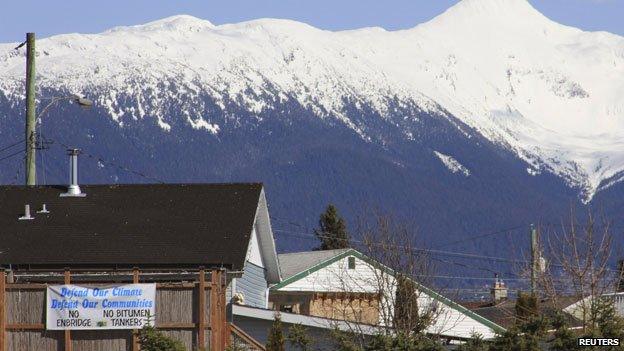Northern Gateway pipeline in Canada approved
- Published

A non-binding resolution in Kitimat - one end of the proposed pipeline - saw a majority of residents vote against the project
Canada has conditionally approved a pipeline to bring oil from the Alberta oil sands to the country's Pacific coast over heavy criticism.
The 1,177-km (731 miles) pipeline project, known as the Northern Gateway, is expected to transport 525,000 barrels a day to Asia-bound tankers.
The move was expected after a review board recommended the pipeline in 2013.
But critics say Canada's conservative government is ignoring the objections of First Nations and environmentalists.
Ahead of the approval on Tuesday New Democrat Leader Tom Mulcair said multiple towns along the pipeline, 130 First Nations groups in British Columbia and hundreds of scientists were against it.
"The prime minister endorsed this pipeline publicly three years ago," Mr Mulcair said ."No matter what evidence, how many people speak out, how many people stand up against him, he keeps pushing this project."
Mr Harper has said diversifying Canada's oil sands production is essential, especially after President Barack Obama has delayed a decision on the Keystone XL pipeline, which would bring crude to the Gulf of Mexico.


At the scene - Elizabeth Davies, Kitimat, British Columbia
Kitimat is just one small town on the pipeline route. But the debate there is a microcosm of a wider debate: to what extent should economic growth and the development of natural resources be prioritised over protection of the environment and traditional ways of life?
On one side are the governing Conservative party, who are keen to use the oil sands as the engine of Canada's economic growth.
In 2012 Cabinet minister Joe Oliver sent an open letter to the Globe & Mail newspaper, in which he described Northern Gateway as an "historic choice", and accused the pipeline's opponents of having a "radical ideological agenda".
Mr Oliver's comments are still brought up angrily by opponents today. They range from First Nation groups, to environmentalists, to labour unions who say pipelines just ship jobs overseas.
Northern Gateway "has become a battle for the soul of Canada", says George Hoberg, a professor of environmental policy at the University of British Columbia.

The northern Alberta region has the world's third largest oil reserves, with 170 billion barrels of proven reserves, and 97% of its oil exports currently go to the US.
In a statement, Natural Resources Minister Greg Rickford said the pipeline's owner, Enbridge, must meet the 209 conditions Canada's regulator imposed on the pipeline.
"The proponent clearly has more work to do in order to fulfill the public commitment it has made to engage with Aboriginal groups and local communities along the route," he said.

Prime Minister Stephen Harper has said the pipeline will help Canada's oil economy in the long-term
Enbridge says the project would result in 3,000 new construction jobs in British Columbia and 560 long-term jobs.
Tuesday's approval is a major step in a series of permits Enbridge will need to construct the pipeline between Bruderheim, Alberta to Kitimat, British Columbia.
One pipeline of the two would bring a type of crude called diluted bitumen to the coast, the other would take condensate, used to dilute the crude, in the other direction.
And challenges from the province's First Nations groups, which have never signed treaties with the government, leaving the ownership of their land disputed, have already been filed against the pipeline.
Some residents along the Pacific coast end of the proposed pipeline say a potential tanker spill, like the 1989 Exxon Valdez spill off of Alaska, would be catastrophic to the area, especially those who fish crab in its waters.
On Tuesday, Prime Minister Stephen Harper accused pipeline critics of being "hostile" to Canada's energy sector and said the government had a process to evaluate risks and benefits for such projects.
